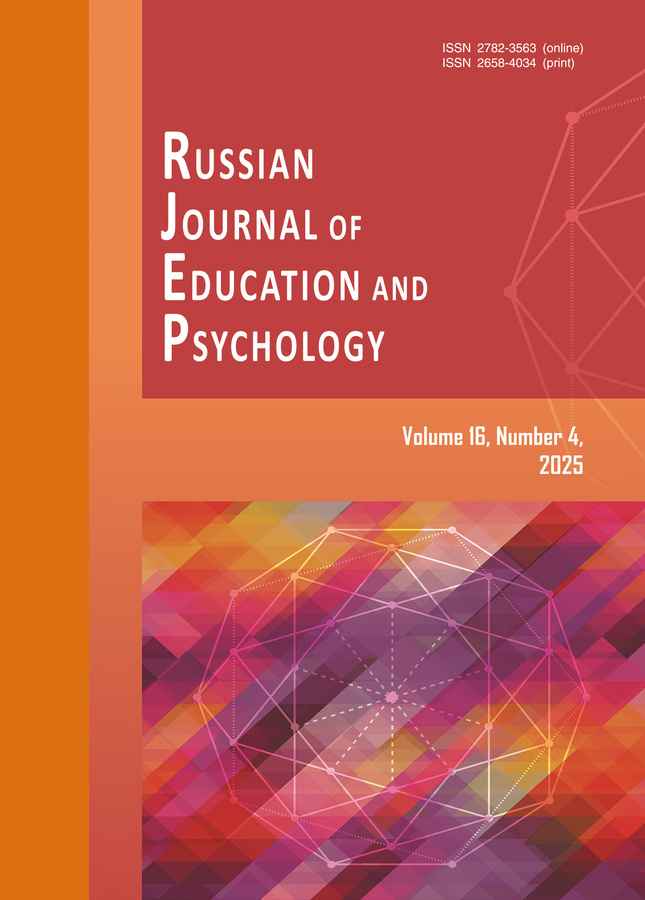Scientific justification of the method «Neurographics»: The phenomenon of «Smart Hands»
- Autores: Piskarev P.M.1
-
Afiliações:
- Institute of Psychology of Creativity Pavel Piskaryov
- Edição: Volume 16, Nº 4 (2025)
- Páginas: 618-632
- Seção: Psychological Studies
- ##submission.datePublished##: 30.09.2025
- URL: https://journal-vniispk.ru/2658-4034/article/view/349056
- DOI: https://doi.org/10.12731/2658-4034-2025-16-4-911
- EDN: https://elibrary.ru/ZOYELQ
- ID: 349056
Citar
Texto integral
Resumo
Background. The relevance of the fundamental justification of psychological methods is due to the stressful states of society. The "Neurographics" method, based on graphic drawing, interacts with conscious and unconscious structures of the psyche, developing fine motor skills and stimulating the neuronal system, helps to relieve tension and transform destructive situations. The effectiveness of the method is confirmed by research in the field of psychophysiology and neuroscience, as well as the work of scientists who distinguish the role of mirror neurons and dopaminergic systems of the brain in the creative process.
Purpose. A study of scientific papers on neurobiological processes in the brain during stress and when using psychotechnics related to drawing, including the "Neurographics" method as a way to restore neural connections
Materials and methods. Studies by Russian and foreign scientists confirm that the creative process activates the sensory and emotional regions of the brain, integrating cognitive and physical processes through drawing. Neurography, by interacting between the left and right hemispheres of the brain, promotes structuring and clarity of thought. In the process of creating a neuro-picture, emotional tension decreases, the parasympathetic nervous system is activated.
Results. The scientific studies of penetration into the psychophysiology of creativity described in this article have shown that activities of any creativity have a positive effect on stabilizing the emotional state, reducing anxiety during stress, increasing self-esteem, developing communication and cognitive skills. The Neurographics method is a complex thinking process. Diving into the depths of the subconscious, practitioners unconsciously activate the left hemisphere, which creates graphic lines, then consciously turn to the right hemisphere, which makes up the overall picture. This helps to adjust the attitude to life, smoothing out sharp corners - after all, in nature itself there are no sharp corners, they should not be in life either. Releasing positive energy, a person gains new strength and begins to create.
Palavras-chave
Sobre autores
Pavel Piskarev
Institute of Psychology of Creativity Pavel Piskaryov
Autor responsável pela correspondência
Email: p.piskarev@mail.ru
Código SPIN: 2275-0546
Doctor of Psychology, Professor
Rússia, 5, bldg. 1 V, Ushinsky Str., St. Petersburg, 195267, Russian Federation
Bibliografia
- Bekhtereva, N. P. (2001). The human brain is ready for everything in advance, lives as if not in our century but in the future, surpassing itself. Science and Life, 7, 14–21. EDN: https://elibrary.ru/DDXAER
- Bekhtereva, N. P. (2007). Magic of creativity and psychophysiology: Facts, considerations, hypotheses. Neurological Journal, 39(3), 5–12.
- Bogoyavlenskaya, D. B. (1983). Intellectual activity as a problem of creativity (173 pp.) / Ed. by B. M. Kedrov. RostovonDon: Rostov University Press.
- Bogoyavlenskaya, D. B. (1971). A method for studying intellectual activity: Abstract of the dissertation for the degree of Candidate of Psychological Sciences (pp. 12–13). Moscow: Research Institute of General and Pedagogical Psychology, Academy of Pedagogical Sciences of the USSR.
- Grigorieva, O. G., Kuznetsova, Yu. M., Nikitina, E. N., Stankevich, M. A., & Chudova, N. V. (2022). Causalemotional analysis. Part II: Studying YouTube viewers’ reactions to propaganda. Psychological Journal, 43(4), 90–98. https://doi.org/10.31857/S020595920021484-8. EDN: https://elibrary.ru/QVNUHG
- Piskarev, P. M. (2020). Algorithm for removing limitations (1st ed., 224 pp.). Moscow: Bombora Publishing House.
- Rakhimkulova, A. S., & Rozanov, V. A. (2020). Association of adolescent mental health problems with subjective experience of stress. Issues of Children’s and Teenagers’ Mental Health, 20(3), 18–27. EDN: https://elibrary.ru/YALPJA
- Rozanov, V. A. (2013). Stress and mental health: Neurobiological aspects. Social and Clinical Psychiatry, 23(1), 79–86. EDN: https://elibrary.ru/QADGOP
- Starchenko, M. G., Bekhtereva, N. P., Pakhomov, S. V., & Medvedev, S. V. (2003). Studying the brain organization of creative thinking. Human Physiology, 29(5), 151–152. EDN: https://elibrary.ru/OOTZBL
- Bogen, J. E., & Bogen, G. M. (1988). Creativity and the corpus callosum. Psychiatric Clinics of North America, 11(3), 293–301.
- McGilchrist, I. (2009). The master and his emissary: The divided brain and the making of the Western world (608 pp.). USA: Yale University Press. ISBN: 9780300148787.
- Porges, S. W., & Dana, D. (2018). Clinical applications of the polyvagal theory: The emergence of polyvagal informed therapies (1st ed., 464 pp.). New York: W. W. Norton & Company.
- Rizzolatti, G., & Craighero, L. (2004). The mirror neuron system. Annual Review of Neuroscience, 27, 169–192. https://doi.org/10.1146/annurev.neuro.27.070203.144230
- Shapiro, L. (2011). Embodied cognition (304 pp.). New York: Routledge. ISBN: 9781138746985.
- Westbrook, A., & Braver, T. S. (2016). Dopamine does double duty in motivating cognitive effort. Neuron, 89, 695–710. https://doi.org/10.1016/j.neuron.2015.12.029
Arquivos suplementares










